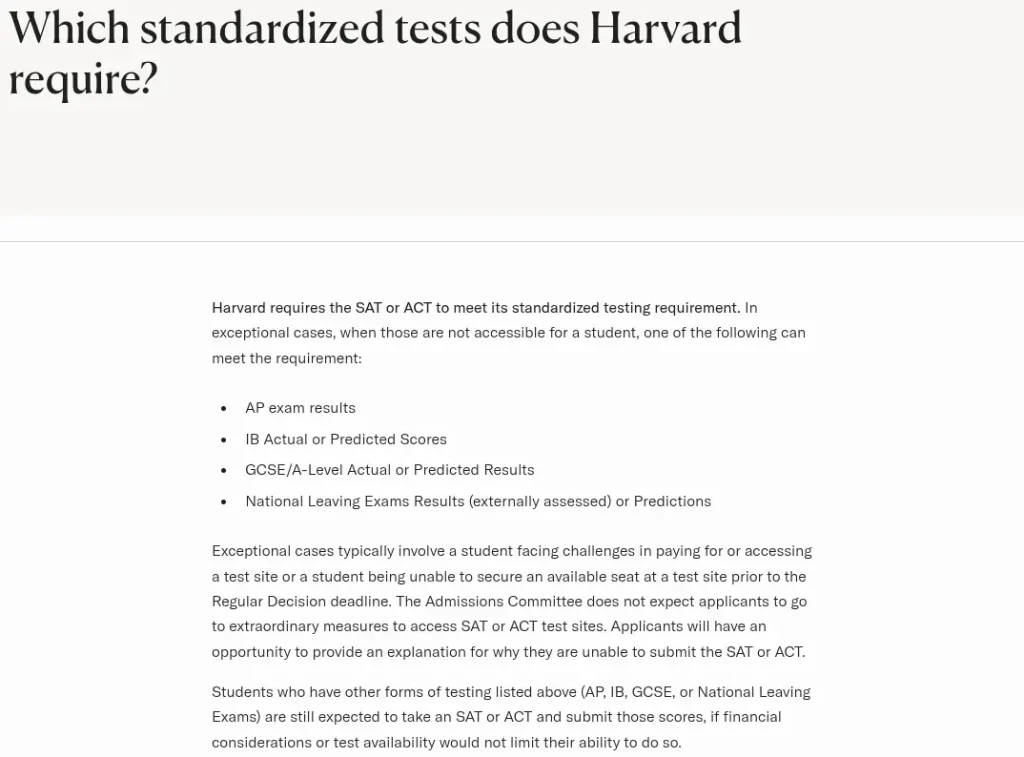Improve Your AP Grades Within One Semester
1. What is "Test-Optional"?
“Test-optional” refers to a policy where students are not required to submit standardized test scores, such as the SAT or ACT, as part of their college application. This movement began in U.S. universities around the early 2000s, with many arguing that requiring SAT or ACT scores created an unfair advantage, as not all students have the financial resources to prepare for and take these exams. However, over the past decade, this movement has gained significant momentum. The outbreak of the COVID-19 pandemic created challenges for students in participating in standardized tests. As a result, during and after the pandemic, nearly 2,000 U.S. universities implemented “test-optional” policies in their admissions process, giving students the freedom to decide whether to include test scores in their application materials.
2. The Return of Standardized Test Scores in the 2024-2025 Academic Year
The “test-optional” policy, which allowed students to opt out of submitting SAT/ACT scores, reduced the pressure on students during the college application process. However, many U.S. universities felt this change made their admissions process more challenging.
In 2022, the Massachusetts Institute of Technology (MIT) announced that it would require students to submit standardized test scores again for upcoming admissions cycles. The 2024-2025 admissions cycle marked the first post-pandemic season, signaling the return of SAT/ACT requirements at many U.S. universities, not just one.
Below is a list of universities that require the SAT/ACT for their 2025-2026 admission period, according to the College Board.
| US News Ranking | School | Location |
| 30 (National Universities) | University of Florida | Gainesville, FL |
| 30 (National Universities) | University of Texas at Austin | Austin, TX |
| 33 (National Universities) | Georgia Institute of Technology (Georgia Tech) | Atlanta, GA |
| 46 (National Universities) | Purdue University | West Lafayette, IN |
| 46 (National Universities) | University of Georgia | Athens, GA |
| 54 (National Universities) | Florida State University | Tallahassee, FL |
| 98 (National Universities) | Florida International University | Miami, FL |
| 4 (Liberal Arts College) | United States Naval Academy | Annapolis, MD |
| 8 (Liberal Arts College) | United States Air Force Academy | USAF Academy, CO |
| 8 (Liberal Arts College) | United States Military Academy | West Point, NY |
Some private universities also require SAT/ACT scores for 2025-2026 admissions.
| US News Ranking | School | Location |
| 2 | Massachusetts Institute of Technology (MIT) | Cambridge, MA |
| 3 | Harvard University | Cambridge, |
| 6 | California Institute of Technology (Caltech) | Pasadena, CA |
| 10 | University of Pennsylvania | Philadelphia, PA |
| 13 | Brown University | Providence, RI |
| 15 | Dartmouth College | Hanover, NH |
| 24 | Georgetown University | Washington, DC |
| 63 | University of Miami | Coral Gables, FL |
Many other prestigious universities in the U.S., such as Cornell University and Stanford University, have also announced that they will be reinstating SAT and ACT scores for the upcoming 2025-2026 admissions cycle.
Enroll in Aralia’s AP Preparation Courses
3. The Reasons Behind This Change
The “test-optional” movement in the United States was introduced to make the college admissions process more fair. So why has it faced significant opposition, particularly from prestigious universities like those in the Ivy League?
According to U.S. News, representatives from these universities argue that SAT/ACT scores are essential in assessing applicants’ profiles. Brown University, for instance, believes that standardized test scores reflect a student’s ability to complete their freshman year of college, a perspective supported by multiple studies. Moreover, many admissions counselors at top U.S. universities argue that SAT/ACT scores can reveal a student’s capabilities within the context of their individual circumstances. For example, a student from a rural high school with limited access to advanced courses or educational support may still score significantly higher than the average SAT score of their entire school, indicating strong academic potential.
Additionally, since 2023, students have had the option to take the SAT and ACT online, eliminating the need to travel to test centers and making these exams more accessible. The College Board has also introduced fee reductions or waivers for students from low-income backgrounds, addressing concerns about the cost of the exams.
Universities that require SAT/ACT scores argue that these provide a more comprehensive view of a student’s academic profile, enabling admissions committees to evaluate applicants holistically. For international students who haven’t taken programs like AP, IB, or A-levels, having SAT/ACT scores can make it easier for U.S. universities to assess their applications.
4. When Should You Submit Standardized Test Scores in Your College Application?
Given the changes in standardized testing requirements, students must develop a suitable strategy for applying to U.S. universities. After creating a list of the universities you wish to apply to, you should check each school’s SAT/ACT requirements. If any of the universities on your list require standardized test scores, you will need to prepare for and take the SAT/ACT to apply. Below are some strategies for submitting standardized test scores in your U.S. study abroad application, especially if the university you are applying to still follows a “test-optional” policy.
Consider Submitting SAT/ACT Scores Based on the Quality of Your Academic Profile:
If none of the universities on your list require standardized test scores, you should base your decision on your academic profile and the competitiveness of the school. For example, if you have a strong academic record with achievements such as international competition awards, scientific research, and high AP/IB scores, you might choose not to submit SAT/ACT scores. However, for highly competitive schools, such as your “reach schools,” strong SAT/ACT scores could make your application stand out more.
Deciding to Submit SAT/ACT Based on Your Actual Test Scores:
How you perform on the SAT/ACT will also help determine whether you should submit standardized test scores. U.S. News recommends that you submit your test scores if they are above or within the average range for the university you’re applying to, based on data from previous admissions cycles.
Researching Admissions Data from Previous Years:
You should thoroughly research admissions data from previous years to make an informed decision. For example, if most applicants in past years submitted standardized test scores, you may want to consider doing the same to help your application be more easily considered and compared.
Deciding Based on Your Chosen Major:
At least 50% of the SAT/ACT exams are language-based, which is essential for any field of study. However, if your language scores are only average, you can decide whether to submit your scores based on your chosen major. If you’re applying for STEM fields and have high math scores on the SAT/ACT, it would be beneficial to submit those scores.
Ultimately, the decision to submit SAT/ACT scores should be made based on a comprehensive review of your entire application. Consider both sides of the issue carefully. What benefits will submitting your SAT/ACT scores bring to your application? Will it highlight your academic abilities? If you choose not to submit SAT/ACT scores, what parts of your application can demonstrate your potential to the admissions committee? This decision might vary depending on the schools you’re applying to, so take the time to research and make the best choice.
For schools that require SAT/ACT scores, some universities, like Harvard, offer alternatives if you’re unable to take standardized tests due to financial constraints or lack of available testing dates. In these cases, you may be able to submit AP, IB, GCSE/A-level, or national high school graduation exam scores as substitutes.












